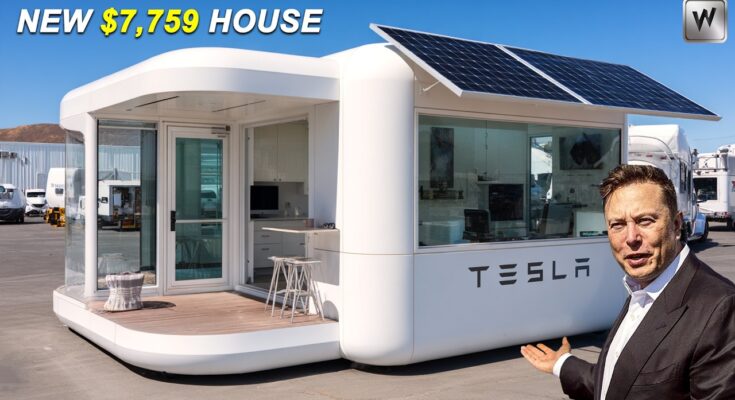Elon Musk Unveils Tesla Tiny House: A Vision for Sustainable, Affordable Living by 2026
In a characteristically bold announcement that sent waves through the technology, automotive, and real estate sectors, Elon Musk has revealed plans for the Tesla Tiny House. Slated for a 2026 release, this initiative is more than just a new product; it’s pitched as a holistic solution to the intersecting crises of housing affordability and sustainable living. Dubbed “Land Free for the Masses,” the project aims to leverage Tesla’s expertise in energy, manufacturing, and automation to create a compact, self-sufficient dwelling for the modern era.
Beyond a House: An Integrated Ecosystem
The Tesla Tiny House, based on preliminary specifications, is not merely a prefabricated structure. It is designed as a fully integrated ecosystem built on the same principles as Tesla’s vehicles and energy products.
-
Energy Independence: At its core, the dwelling will be powered by a proprietary solar roof and Solar Glass tiles, feeding into a compact yet powerful next-generation Powerwall battery system. This setup is designed to make the home entirely off-grid capable, eliminating electricity bills and providing resilience during power outages.
-
Sustainable Materials: Tesla has emphasized the use of recycled and highly durable materials. The exterior will likely feature a combination of lightweight composites and Tesla’s patented glass, while the interior will maximize space with a minimalist, efficient design ethos reminiscent of a Cybertruck’s interior.
-
Smart Home Integration: Seamless integration with Tesla’s ecosystem is a given. Residents can expect native control over climate, lighting, security, and media via a central touchscreen or voice commands, all synced with the Tesla app on their phone.
The design, from leaked conceptual images, suggests a sleek, angular aesthetic—a clear sibling to the Cybertruck—with a focus on maximizing interior space through innovative, multi-functional furniture and built-in storage solutions.
The “Land Free” Proposition: A Radical, Unclear Concept
The most provocative part of Musk’s announcement is the “Land Free for the Masses” tagline. This has been the subject of intense speculation and skepticism. Industry analysts propose several interpretations:
-
Partnerships with Sustainable Communities: Tesla may be in talks with developers to create new, master-planned communities specifically for these dwellings. These communities could be located on less expensive, non-urban land, with infrastructure supported by Tesla’s solar and battery farms.
-
A Modern Homesteading Model: Drawing parallels to historical homestead acts, some suggest Tesla could facilitate access to unused or government-owned land under agreements that promote sustainable development and energy independence.
-
A Financing and Mobility Hook: The term “Land Free” might be more metaphorical, relating to the freedom from traditional utilities and mortgages. Alternatively, it could hint at the dwelling’s mobility. If designed on a certified trailer platform, it could be towed by a Cybertruck, literally allowing owners to move their home to available land.
“Elon Musk is a master at reframing impossible challenges into marketable products,” said Dr. Evelyn Reed, an urban planning professor at MIT. “The ‘free land’ concept is the most tenuous part of this vision. Land has value and ownership is complex. However, if anyone can leverage technology to decouple quality of life from prime real estate location, it’s a company like Tesla. The real innovation isn’t the structure itself, but the potential to create self-sustaining micro-communities on previously undesirable land.”
Market Impact and Skeptical Challenges
The announcement has already stirred strong reactions. Advocates for affordable housing see potential, while others urge caution.
Potential Benefits:
-
Addressing Housing Shortages: Prefab, modular homes can be produced rapidly and at scale, potentially easing housing crises in certain markets.
-
A Boost for Renewable Energy: Mainstreaming a fully solar-powered home could accelerate the adoption of renewable energy nationwide.
-
Disaster Resilience: These structures could serve as ideal temporary



